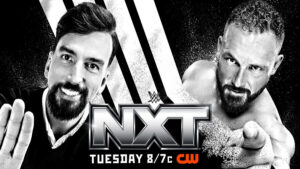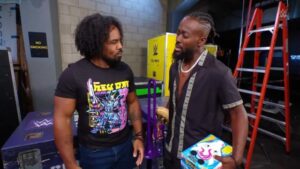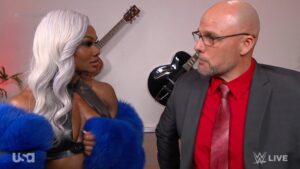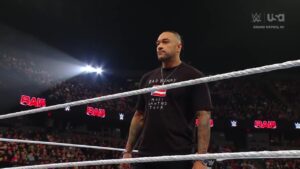When “Hangman” Adam Page returned to AEW Dynamite as the wildcard in the Owen Hart Memorial Tournament, two patterns were repeated in the storyline. First, the return of Page coincided with an AEW World Championship title shot.
Returning as “The Joker” in the October 6th Casino Ladder Match in 2021, Page secured his shot against former tag team partner and “The Best Bout Machine”, Kenny Omega. This version of Page is altered.
On the surface, a lot has changed. The Hangman is now an anti-hero filled with justified malice.
There is no humor in his graphics. There’s a dark cloud consuming him on the way to the ring.
There was little mercy for Jeff Jarrett. No qualms about taking advantage to put away Jay White.
The rage and fury; the heat is burning through the casement. Things have not been forgotten.
Even with Renee Young, there was tension because of Page’s past war with Jon Moxley. Although it wasn’t needed, delivered like Shakespeare or prestige cinema, the post-Collision promo where Hangman made it clear he’s coming to incinerate Swerve Strickland and his championship reign has made it undeniable.
And yet, despite a lot that has changed, the valley Page finds himself in is shrouded, hiding that he has been in this same place before. This ties to the second pattern: real human behavior when relapsing.
Related to mental health, relapse means to slip into a former or worse state after a period of improvement. Although in some ways, Page’s presence since his return has lost its surface-level anxiety, uncertainty, and hesitation, it doesn’t mean it’s gone.
Re-Ploughing the Same Field
As a depiction of the complex issues of mental health, Page’s storyline has broken new ground already. Weakness as strength.
Going against wrestling traditions to make a male character vulnerable in a way that is relatable without the superstar armor. I’ve already analyzed how the Hangman Page character depicts the reality of mental health, specifically imposter syndrome (read here).
As an anxious millennial, lots of the character’s attributes are uncomfortably familiar because they are relatable. Everyone knows the expression that those who forget history are doomed to repeat it.
In psychology, Freud termed this the concept of “repetitive compulsion”. It describes how we, as individuals, can subconsciously repeat – without realizing it – forgotten, repressed behaviors. Including those of old we thought we moved past.
At times, on instinct, we repeat our actions based on muscle memory. As responses to difficulties, trauma, and bad experiences.
I’m sure we all know someone who does this. Or maybe you are aware of your own slips into old habits.
The faults in your own problematic self-defense mechanism. Even when we think we have left them behind and moved on.
These furrows are dug into our Earth. They are there already.
It’s easy to slip back into them. The grooves are unknowingly comfortable.
Blind by some new self-driven narrative to convince yourself you aren’t making the same mistakes again. Now, re-ploughing the same field with a new blade will turn up something new for Page.
Alongside reminders of the past. More than the drinking and isolation.
Other behaviors to go along with the updated, self-denying twist of the old story of Page not feeling he is good enough.
The Justification – The Understandable Narrative
Is Hangman a face or a heel? Many I’ve seen have stated he is an anti-hero.
For some, Page is the main character of AEW again. Like the lead characters in prestige TV shows, from Mad Men’s Don Draper to Walter White in Breaking Bad, many viewers side with the protagonist’s actions and reasoning.
Despite their reasoning and logic being flawed or self-interested. With anti-heroes, we as an audience often invest in their reasoning.
Their justification for why they are a good person who must do bad things to achieve righteous ends. We believe their narratives at face value. Why?
Partly, it’s empathy and sympathy. We can see ourselves in these figures somewhat.
Folks who don’t fit into their cultures. Individuals who felt outcast, overlooked, or made weak by a system or individuals.
It seems, even in the smallest way, like our own stories. It’s all again relatable.
The other part is conviction. It sounds right because it’s emotive.
The evidence they present seems wholly true. It makes us think they are right.
In wrestling, the idea of the justified heel is an old one. Many believe Page is justified because he was let down.
Like heels before, one reason many give for turning is us, the fans. We turned our back on them first.
“I gave them everything that I had. I gave them every damn thing that I had, and they chose him!”
Adam Page, AEW Collision, 7/8/24
We betrayed Page with our support for Strickland. It’s not just about what Strickland took and did to Page.
It’s about us as fans abandoning him. The fault is external.
Hangman did nothing wrong. The world turned on him.
History Repeating – Losing the Support Network
In 2023, Hangman reunited with The Elite. Things came full circle, but not in the way many fans perhaps hoped for.
Messy storytelling was a problem for The Elite’s supposedly “putrid 2023”. Perhaps unintentionally, this has fed into the current storyline.
Re-joining The Elite did not solve any of Page’s insecurities or issues. A huge hint prior to All In 2023 was a backstage segment where Page, next to the ambulance in which Kenny Omega was being loaded, was holding a can of beer.
Many fans began speculating on what this Easter egg meant. Post-All In, The Elite fragmented again, going down their own separate paths.
Repeating and creating the same conditions again for Hangman’s insecurities. Especially when feeling alone fighting Strickland.
When Strickland broke into Hangman’s house and threatened Page’s child, Page sprinted backstage alone. The Elite again failed to support Page.
That support network that had existed before with The Dark Order was gone. That bridge burnt.
Page’s only support network was the fans. Page described in a Men’s Health article how “there’s no amount of money you can pay for therapy like this, to hear thousands of people clamoring for you.”
The fans were Page’s last support mechanism. So, in choosing Strickland, despite what Strickland did, it seems like a logical breaking point.
Add to this that Strickland beat Page twice. On the third occasion, they drew.
Page failed to stop Strickland from winning the AEW World Championship. Failure and a lack of support created the conditions for that old story of imposter syndrome and insecurity to return.
This time with something darker.
It’s Still the Same Story, Same Goal with the Same Motivation
Although the huge differences in arcs, the outcome for Page is the same. It’s just disguised over the motivation of vengeance.
Of doing it for his family. Of getting justice in the often-unfair reality of the world that is wrestling.
While the reasoning seems true, his motivations are selfish. Page is looking to defeat a person who has beaten him and denied him from demonstrating that he is not inferior.
Like in his hunt against Omega, who also beat Page on his road to the world title, Strickland has the AEW World Championship. Page wants to take this from Strickland because, as a symbol, it represents being the best.
In winning it, the championship is symbolic of some sense of justice. Would winning the championship actually vindicate those kayfabe emotions of having a man threaten your child?
Even within the confines of wrestling, is that going to be satisfactory justice? Or, like in real life, a sentence or getting exactly what we wanted from someone being punished doesn’t fill the large hole left inside.
In beating Strickland, will that get the fans back on the Hangman character’s side? Because, as seen when we chose Strickland, fans are fickle.
Winning the championship last time only worked as temporary medicine. Eventually, the belt will be lost.
At some point, the medicine, as Hangman previously stated before, stops working. That sense of inferiority, weakness of being unable to stop something that a man, a father is supposed to do, protect and defend their family, can’t be undone.
Adam Page Running on Anger
Wanting to deliver two buckshots to Bryan Danielson in the Owen Hart Cup Tournament finals, rather than get the pin, was not fuelled by justice. Beating or choking a man with a belt wasn’t about Page getting redemption for his family.
That was anger and insecurity in pursuit of a temporary sense of relief. Attacking Jeff Jarrett at the Royal Rampage isn’t going to get Page that shot against Strickland.
It just feels good to have someone to blame. Again, a very human trait.
We need an enemy. Then when the perceived bigger enemy is out of reach, someone else will become a placeholder in the meantime.
What we may see in the coming months is a reversal of Hangman’s first run in that the obstacles Page might face are not going to represent steps in his emotional recovery. Rather, they might reflect further, and further lines crossed in the justification that Page is seeking justice.
Further and further becomes like Strickland, with Page losing his sense of self in the process. That seems like the next step with Jarrett.
And also with the teased feud with Kazuchika Okada. Again, this would fit with Page’s insecurities.
Okada has nothing to do with Strickland. Rather, Page’s feeling of being inferiority.
More jealous than justified. Frustrated that his former best friends have replaced him with someone who judging by various metrics is better.
Like with TV shows like Breaking Bad, fans will ignore the immorality with Page because the ends justify the means. Besides, who hasn’t felt that way?
That it’s everyone else’s fault but their own? And who has wanted to do something about that?
Because they feel justified in doing it.
Close to the Bone
“I wouldn’t even say [the story] has borrowed from my real life, as much as it is [real life] … Each step of the way, I’d ask myself, ‘How do I feel about this right now?’ And I’d just give you the truth.”
Truth in the “Hangman” Adam Page character cuts close to the bone. Fairly recently, I slipped into my own previous patterns of behavior.
Without going into vast detail, various external factors impacted my life and those of loved ones.
No one broke into my house or threatened my dogs. Yet, like Page, I felt that I could handle things alone.
To help others, I put some distance between my feelings and them. I didn’t want to burden anyone.
But in doing so, the negative voices had space and time to speak freely. And then, the story they retold me was about my own insecurities and sense of inferiority.
The aspect of Page’s arc that most strikes me is that without a support network, and without others to help you, you find yourself trapped in a self-destructive, self-fulfilling narrative. Part of which tells you that no one can help you.
It’s not true. And as we will likely see with time, Page will rebound once again.
With perhaps more elements of reality bound into the fiction.
More From LWOS Pro Wrestling
Header photo – AEW – Stay tuned to the Last Word on Pro Wrestling for more on this and other stories from around the world of wrestling, as they develop. You can always count on LWOPW to be on top of the major news in the wrestling world. As well as to provide you with analysis, previews, videos, interviews, and editorials on the wrestling world. You can catch AEW Dynamite on Wednesday nights at 8 PM ET on TBS. AEW Rampage airs on TNT at 10 PM EST every Friday night. AEW Collision airs Saturday at 8pm Eastern on TNT. More AEW content available on their YouTube.


![AEW’s “Hangman” Adam Page and Mental Health: Relapse [New Japan Pro Wrestling, CC BY 3.0 , via Wikimedia Commons]](https://lastwordonsports.com/prowrestling/wp-content/uploads/sites/15/2024/08/Hangman_Adam_Page_in_NJPW_2018_-_1.png)



